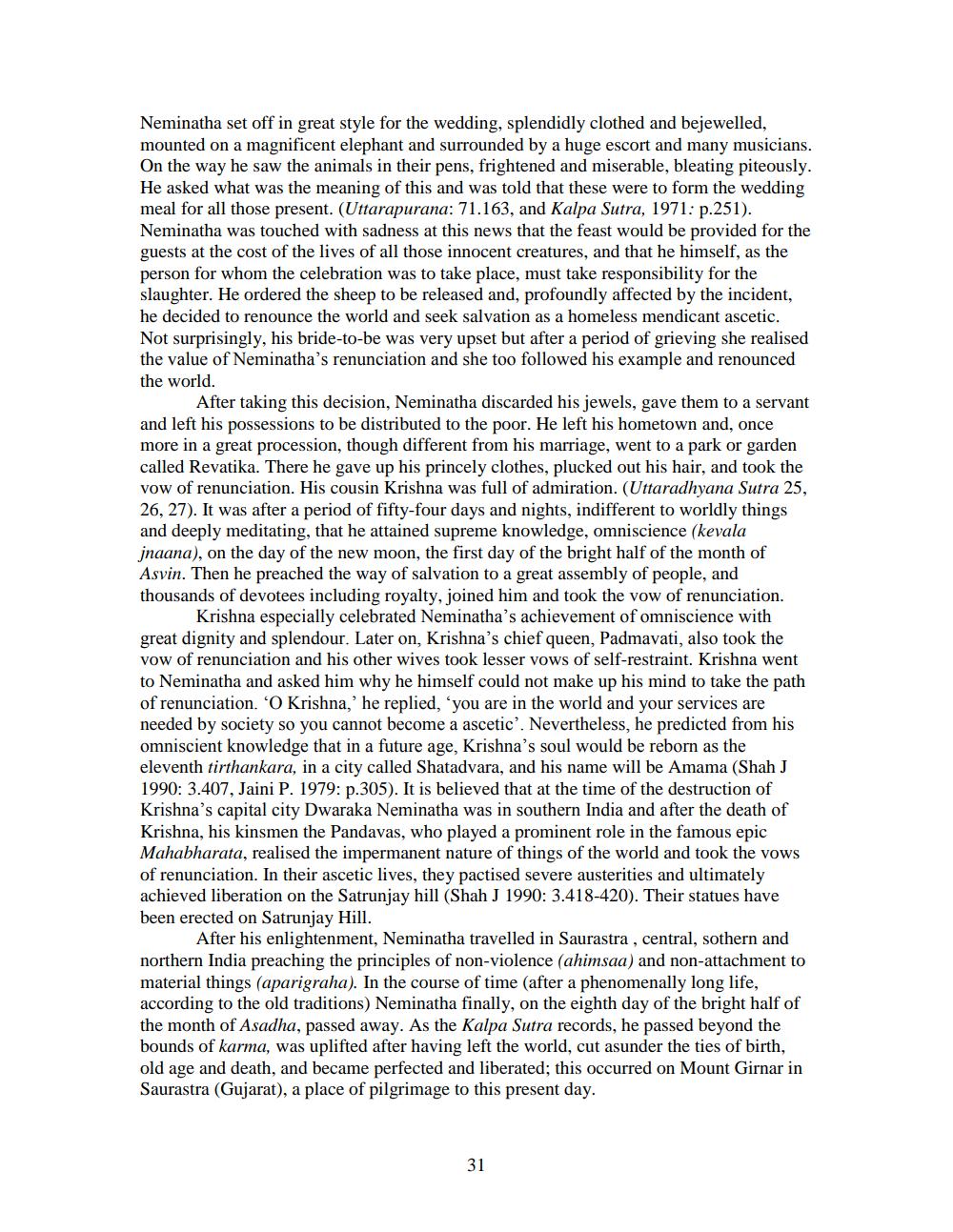________________
Neminatha set off in great style for the wedding, splendidly clothed and bejewelled, mounted on a magnificent elephant and surrounded by a huge escort and many musicians. On the way he saw the animals in their pens, frightened and miserable, bleating piteously. He asked what was the meaning of this and was told that these were to form the wedding meal for all those present. (Uttarapurana: 71.163, and Kalpa Sutra, 1971: p.251). Neminatha was touched with sadness at this news that the feast would be provided for the guests at the cost of the lives of all those innocent creatures, and that he himself, as the person for whom the celebration was to take place, must take responsibility for the slaughter. He ordered the sheep to be released and, profoundly affected by the incident, he decided to renounce the world and seek salvation as a homeless mendicant ascetic. Not surprisingly, his bride-to-be was very upset but after a period of grieving she realised the value of Neminatha's renunciation and she too followed his example and renounced the world.
After taking this decision, Neminatha discarded his jewels, gave them to a servant and left his possessions to be distributed to the poor. He left his hometown and, once more in a great procession, though different from his marriage, went to a park or garden called Revatika. There he gave up his princely clothes, plucked out his hair, and took the vow of renunciation. His cousin Krishna was full of admiration. (Uttaradhyana Sutra 25, 26, 27). It was after a period of fifty-four days and nights, indifferent to worldly things and deeply meditating, that he attained supreme knowledge, omniscience (kevala jnaana), on the day of the new moon, the first day of the bright half of the month of Asvin. Then he preached the way of salvation to a great assembly of people, and thousands of devotees including royalty, joined him and took the vow of renunciation.
Krishna especially celebrated Neminatha's achievement of omniscience with great dignity and splendour. Later on, Krishna's chief queen, Padmavati, also took the vow of renunciation and his other wives took lesser vows of self-restraint. Krishna went to Neminatha and asked him why he himself could not make up his mind to take the path of renunciation. 'O Krishna,' he replied, you are in the world and your services are needed by society so you cannot become a ascetic'. Nevertheless, he predicted from his omniscient knowledge that in a future age, Krishna's soul would be reborn as the eleventh tirthankara, in a city called Shatadvara, and his name will be Amama (Shah J 1990: 3.407. Jaini P. 1979: p.305). It is believed that at the time of the destruction of Krishna's capital city Dwaraka Neminatha was in southern India and after the death of Krishna, his kinsmen the Pandavas, who played a prominent role in the famous epic Mahabharata, realised the impermanent nature of things of the world and took the vows of renunciation. In their ascetic lives, they pactised severe austerities and ultimately achieved liberation on the Satrunjay hill (Shah J 1990: 3.418-420). Their statues have been erected on Satrunjay Hill.
After his enlightenment, Neminatha travelled in Saurastra, central, sothern and northern India preaching the principles of non-violence (ahimsaa) and non-attachment to material things (aparigraha). In the course of time (after a phenomenally long life, according to the old traditions) Neminatha finally, on the eighth day of the bright half of the month of Asadha, passed away. As the Kalpa Sutra records, he passed beyond the bounds of karma, was uplifted after having left the world, cut asunder the ties of birth, old age and death, and became perfected and liberated; this occurred on Mount Girnar in Saurastra (Gujarat), a place of pilgrimage to this present day.
31




